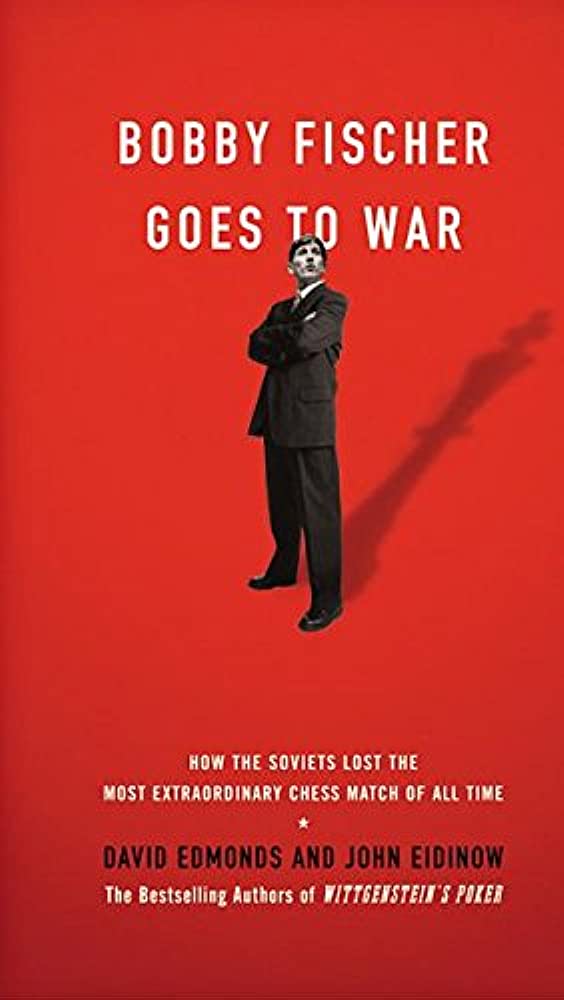Bobby Fischer Goes to War
How the Soviets Lost the Most Extraordinary Chess Match of All Time
The Mother of All Matches
If Bobby Fischer’s name is affiliated with a book, it comes to reason that there is some amount of weirdness forthcoming. I am not referring to the chess books Fischer wrote, as those are guidelines to chess perfection. This refers to any discussion of his life, which this book does. The world’s greatest chess player, Fischer, has lived his personal life much less logically than his life in an eight by eight square cell.
To help the non-chess reader sort out the menagerie, authors David Edmonds and John Eidinow provide a “Dramatis Personae,” listing 21 Americans, 24 Soviets, six Icelanders, four match officials, and six sundry others, explaining their relationship to the Reykjavik, Iceland chess match. They also include a short glossary to educate us in the vocabulary of competitive chess.
The book begins with a vital quote by Boris Spassky,
When you play Bobby, it is not a question of whether you win or lose. It is a question of whether you survive. This sets the tone for all that follows.
Edmonds and Eidinow lay out the social mire Fischer was growing up in, and his quick rise to chess dominance.
In 1954, when Fischer was 11, he was attending matches and doing well enough but not at his later prodigy level. In that year, as he is quoted, he “just got good.” Modern chess history, or at least for one its most colorful characters, begins then.
1972: Boris Spassky was the champ. He deserved to be there. Bobby Fischer was the contender. He deserved to have the opportunity. Between these two men stood a world of complex politics, money, national pride, idiosyncrasies, and suitors to the game. Reykjavik, Iceland was the location of what has become one of the most legendary chess matches ever, between Spassky and Fischer.
Early on during Fischer’s career, he had the same impact Michael Jordan would later enjoy later enjoy as professional basketball player. “Fischer-fear” was the description of some players’ psychosomatic illnesses from Fischer’s intimidation. Opponents would make mistakes as a result. Fischer had the bravado of Muhammad Ali, but none of his class. He would take this personality and boorish demands to the match.
Boris Spassky is painted differently. A product of the Soviet support system, he became professional about the game. Affable and popular, an opposite to in every way to Fischer, he still had what Fischer lacked — the title “World Champion.”
The bulk of the book moves on from biography and personality profiles. It follows the path the chess culture — all chaotic in its apparent systemic approach. Going from the need to compete to the actual match turned through every convoluted corner, with Kissinger’s involvement, the FBI, the KGB, and as much intrigue as a James Bond movie.
The travails of the match are outlined as needed (but not heavily), highlighting the most interesting parts and never boring nonchess players. The psychology of the players and chess players in general is discussed, as is the history of modern champions, providing a field for tension and a framework for the match.
This was in the midst of the Cold War, and the Soviets — not just Spassky, owned the chess champ title. Nixon was president. Fischer, the bombastic, arrogant American who hated Russia, had a knack for successfully risking it all on the board by knowing the principles of chess as a sublime art form. Spassky, the methodical Russian, against Fischer, became a symbol of the Cold war itself. The image of the match was only half of the matter. Neither man was the caricature the press saw them as, but such are the stories of legend.
I fully recommend “Bobby Fischer Goes to War: How the Soviets Lost the Most Extraordinary Chess Match of All Time,” (title from the hardback edition) by David Edmonds and John Eidinow. Oh, and if you somehow missed the big news back in 1972, Fischer won the match.
Subscribe for Leap Updates
Newsletter may include updates from Tree Fort Books, American Speechwriter, Joro Spider Appreciation, and other Trendl Communications projects. No spamming and always interesting.
Copyright (c) 2025 Anthony Trendl. All rights reserved. Sponsor: AmericanSpeechwriter.com.
As an Amazon Associate, we may earn commissions from qualifying purchases from Amazon.com.
